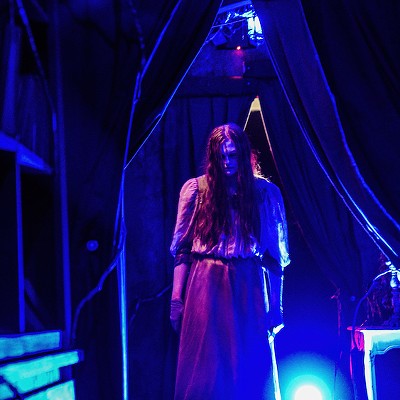
But playwright LeRoi Jones, soon to follow the Black Muslim trend after the assassination of Malcolm X and become Amiri Baraka, doesn’t quite see a bright future. He pens the powerful short play, “Dutchman”—part allegory, part diatribe. It’s a searing work that never ever fades from memory. I encountered it in drama school not long after racial equality was enshrined in law and we marched for the Equal Rights Amendment finally believing that the dream of an equal society was reality.
Sadly, that was a naive notion and thanks to the recent SCOTUS decision, BIPOC women especially now have fewer rights.
The evening opens with a performance art piece that reminds the modern audience that the 1964 drama we are about to see is a direct descendant of Africans being enslaved against their will. A group of Black actors costumed in the starkest white dance across the ocean of a recessed dappled blue floor in smoke-filled beams provided by lighting designer Dalton Hamilton. They flail and contract in movement vocabulary drawn from traditional African steps to the incantations of a tribal shaman. His vocalizing undergirds the opening minutes as he crosses the length of the theater merely feet from the audience. Alexander Jones’ choreography is a visceral choice, even as it diverges stylistically with what’s to follow. However, it unmistakably establishes a larger context for the play. The Civil Rights struggles of 1964 echo-echo-echo the continuous loop back to the original sin of 1619. A light-skinned dancer in an antebellum gown shows up, kicking high, lest we forget the iconography and source of oppression.
Theater works best outside of the realm of realism, when the director and the designers come up with a visual metaphor for the themes of the play. Here the elements of the New York subway are the slave ship, the Dutchman of the title, which Baraka uses as a stand-in. The American Stage team has gone even a step further into abstraction. Set designer Teresa Williams’ subway car (where the action takes place) is on top of an enormous African ceremonial drum with a revolving top and a series of hand-carved decorative storyboard panels lovingly created by Michaela Dougherty. The floating center platform is surrounded by a New York skyline with rows of skyscrapers rising high above the floor. But they’re not crafted from the hard edged metal and glass that we’ve come to associate with the city. Instead, this Big Apple is all constructed from wooden planks to mirror the sleek hulls of the speedy schooners that shuttled slaves in shackled pairs from the African Gold Coast to our shores as part of the triangle trade. If you need a historical reminder, Google “1776 - Molasses to Rum.”
Adebowalé Adebiyi embodies the malleable Clay, the self-proclaimed Baudelaire of Harlem. He’s an intellectual quietly minding his own business in designer Natalie Burton’s tailored, three button suit. Enter the predatory younger Lula (a splendid Shannon Mary Keegan) as a schizophrenic hippie with a ginger mane, celebrating the newfound sexual freedom of the 1960s. In her manipulative eyes, his sartorial splendor becomes a target of derision, a signifier of Clay’s Uncle Tom-ness. Baraka has Lula introduce iconic Biblical apples as an inciting incident just so we get the point. This ignites a pulsating cycle, alternating provocative poses of overt seduction with vile verbal abuse. It becomes a teasing cat and mouse game until Clay can no longer tolerate Lula’s psycho-sexual torment. Their scenes crackle with energy. It’s more racketball than ping pong as the back and forth bounces wildly out of control in all directions. Every vile epithet in common parlance from the swinging ‘60s is thrown around like the popular lawn darts of the era. BTW, the darts have since been banned to save lives, unlike AR-15s—but I digress.
Lula taunts the mild-mannered Clay as the aggression mounts until he becomes Baraka’s mouthpiece. He explodes into a famous long monologue where all the pent up emotion morphs into a takedown of her white girl privilege, spewing forth in powerful language, which heightens the tension like a spring wound too tight. To say any more about what happens in this passive-aggressive flirtatious give-and-take would spoil the many shocking moments that the playwright embedded in his sizzling script. Suffice it to say, that after the “bite of the apple” all hell breaks loose, which the mute ensemble of subway riders do their best to ignore until they are commanded into action.



















